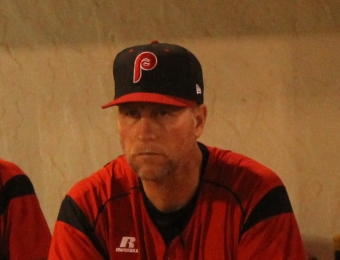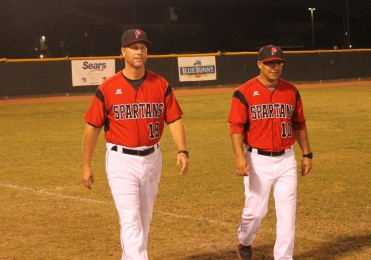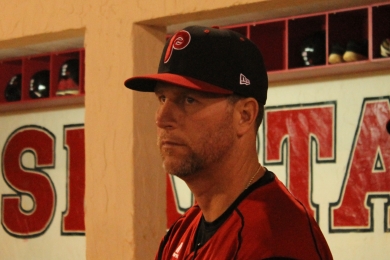Sunday Morning Chat: Monsignor Pace’s Tom Duffin
 Today, HSBN Senior Writer Rick Duteau sits down with Monsignor Pace Manager Tom Duffin, who has taken the Spartans to the state tournament in each of the past two seasons.
Today, HSBN Senior Writer Rick Duteau sits down with Monsignor Pace Manager Tom Duffin, who has taken the Spartans to the state tournament in each of the past two seasons.
Rick: Well Coach, the past two years you have been in the state final four. The first year you didn’t play your best game, and you were beat. Last year your guys played their hearts out in a great game but you said afterwards you were proud of them. Talk about the differences between those two experiences.
Coach Duffin: The first game, the first time we were there two years ago, we lost a one-nothing game to Bishop Verot. That was a tough one because it just seems like we weren’t at fault. We got a great pitching performance from our pitcher Perez and we just couldn’t do anything offensively. We couldn’t do anything, we couldn’t get on. When we did get on, we’d bunt them over and get into situations we just could never get that key hit as we did all year. We were out-dueled from the other pitcher, he kept us at bay, and they got that one key hit and got their only run.
Last year, what a contrast. It was a slug-fest back and forth. And then it became about strong pitching, and see who can hold on at the end. That was a heartbreaker. So we went from basically, we’re happy to get back to the state tournament, saw where we needed to be at, got back with a purpose and we were one hit away. That basically was one of those things where it really, really hurt because that would have been nice to send that senior class out with the state championship, because that was their goal. But again, I was proud of them because no one really expected us to give these guys a shot and they were an undefeated team. It was a good way, either way. It was probably better for them, they had a dream season for us. We went as far as anybody else did.
Rick: From having been there myself, if championships were given out for teams who didn’t actually win it, it would have been you guys and that game. Just as the question said, it was such a great game. If you’re going to have to lose in the finals that would probably be the way that you would want to lose, would be my assumption.
Coach Duffin: Sure, I think that probably, again I’m almost sounding biased, but it was probably one of the better if not the best state championship games in that tournament last year. As far as it went, with extra innings and everything thrown in with the late start.
Rick: The magnitude of everything.
Coach Duffin: The dramatics with the homerun with Gomez, hits the tying home run over the Monster. What a script! It could have only been written better if Palensuela or Gomez got that hit in the bottom of the eighth. That would have been it, you know; or the seventh, I should say.
Rick: I agree, having seen it myself, I still talk about it and I feel that same pride. So I’m sure and can understand when it comes from you, watching them guys playing that type of a game, you can’t help but feel pride knowing that they put it all out there on the field on the largest stage possible.
Coach Duffin: Sure, sure.
Rick: Monsignor Pace is one of the powers in Miami but you seem to stay out of the public’s eyes unlike most coaches. Why is that?
Coach Duffin: I was raised with an expression my dad used to say, “Self-praise, is no praise.” It goes back a ways to where I would like to think that our record, the kids that we’re able to get off to the next level all will speak for itself. I guess back in the day, we seemed to really have a hard time getting a lot of the spotlight with some local newspapers. I won’t mention any names.
Rick: What’s a newspaper?
Coach Duffin: Yeah, what is that nowadays? It’s all internet. With the local newspapers, it seemed like for a little stint there all it was, was concentrating on the negatives. Going back to some stories of some former players that either had to leave the team and it seemed like it always captured what we did not accomplish. Again, I’m not one to comment publically in the paper and fire back at people because that’s not my style. But it all changed in ’06 when we got to the state final and all the papers were calling. I would tell my players ‘If you want to get stuff written about you, you’re going to have to sit there and get to the dance when everyone else’s seasons are over. Then they are forced to write positive things about you.’ So I’ll never forget, we win the semi game, we beat Tampa Jesuit. After a great performance by Chris Herman we win 7-1 and the kid is throwing 95. They were in shock; they didn’t know how to handle it.
The next day we’re getting ready before our final game against Jacksonville Bishop Kenny. So from there I get a call from the newspaper and they want to do an article. ‘So how does it feel? You finally got there. Does this give your program legitimacy?’ And I was taken back by the question and I said, ‘You know what, I don’t feel that making a state championship brings legitimacy to the program.’ It’s great, don’t get me wrong and people look at it. I said, ‘but if you really looked at the true sense of what we’re all about, or should be about in high school, we would have been considered legitimate people a long time ago, because every year we were averaging twenty wins; we were getting ninety-eight percent of our players off to college or pro-ball.’ Which is my biggest accomplishment to this day.
That’s what I always say is more importantly than any championships. So I used the example of Bill Cowher. For many years with the Steelers he was considered a failure just getting himself to the playoffs and never getting to the Super Bowl. And once he won the Super Bowl, now he’s this great coach. So when I threw that analogy out there, I was like, now I know how he feels. I said ‘Look man, don’t even bother interviewing me because we’ve got one more game to worry about and you’re either going to be writing negative things because we lost or positive things.’ I said, “If you want to write stories, write them based on the consistencies of what programs do, and there’s a lot of them out there’. I can name a bunch of programs that haven’t been fortunate enough to win it all, or lucky enough I should say, because there’s a lot of luck involved. And they do a great job year in and year out. I guess you would call that media shy. Again, I go back to what my dad always taught me, self-praise is no praise. It’s not about me; it’s not about what I have accomplished or what we all have accomplished, it’s all about the kids. 
And yes, the tradition I think will speak for itself. When you look at, we’ve got six championships over the years. We’ve done it right. We develop our JV kids. We may not always win every year but we know that in order to get to the state championship they’re going to have to come through our house whether we’re up or down. So there’s always, again as you know, you’ve watched many of our games, they’re always throwing their number ones and that tradition speaks for itself. Well, that’s basically why I’m a little media shy. I’ll let our actions speak for themselves.
Rick: I think that they certainly have. This year’s team is much different then your past few. You have a young squad; your guys have started slowly. After being on top for a long time, how is your approach when you know it needs development?
Coach Duffin: Well, I’ll tell ya, going into the season I felt that I had to check myself for my own demeanor. In the past I was pretty hard on teams as far as demands and also how hard I drove them. And it’s one of those things where, in the past I was able to do that because you had a good nucleus of senior leadership. But here when you’re talking about our team we’re talking about four and sometimes five freshman starters. So basically what you’ve got is a glorified JV team, in all honesty. In other years, most of these kids that are starting for me on Varsity would probably be on a JV team compared to some of the other teams I’ve had in the past.
I’m not saying that they’re not decent Varsity players, but what I am saying is that they’re being thrown into a fire that most high school kids aren’t expected to have to be handling at this time. So I’ve had to mellow out and just really talk to my coaching staff and talk to myself about every week getting better, stressing the fundamentals, stressing the teaching aspect of it and making sure these kids are learning. Because if they are going to ever accomplish anything as a core unit, two, three years down the road then they have to start with building the foundation now.
It’s not easy ‘cause when you’re used to getting twenty wins it’s one of those things where it’s still tough. We want to win and when you’re dropping one-run ball games where all you need to do is get one more out in the seventh and it falls apart on you, again you’re seeing the youth and inexperience take effect. It’s not easy, but yet you’ve got to keep reminding yourself that you’ve got to keep plugging away and again, not losing the ultimate goal and the end result in sight.
Rick: Tell our readers something they would never know about Tom Duffin from watching him on the field.
Coach Duffin: Oh God, probably that I’m a nice guy and that I have a sense of humor. Unless you’re a close friend of mine or you’re in the clubhouse with me, you’re going to look at me as a person that’s real serious a lot of times. You know, people say ‘You never smile’. My dad used to say ‘What did you eat lemons for lunch?’ all the time. What it is, when I’m out on the field it’s a whole other side of me. I was that way as a player and I’m that way as a coach. I’m all fun and games and happiness before you walk on, but once I step onto the field it’s serious business. It’s one of those things where I’m a competitor, and I could be playing people that I’ve known for a million years and I’m gonna want to put it to them and beat their behinds, just like they’re gonna want to beat our behinds. And after the game then I’ll come back into the clubhouse and be a jokester as well. I think that’s something that people don’t really know about me. I guess there’s this reputation as me being real hardcore guy but yet, I do have a heart. I wouldn’t be doing this job for almost twenty years now if I didn’t care about the kids. Ultimately it’s all about the kids for me and enjoying working with people such as my coaching staff, coming to work everyday with those types of guys.
Rick: On what occasion will you apologize to a player?
Coach Duffin: I would probably say if I blamed him for missing a sign and that possibly had relayed the wrong sign. Again, I’m getting old and my mind is fading [laughs]. I’ve been doing this a long time, and there’s been times where maybe I’ve given a sign and I thought what I gave is a certain sign and the player did, whether it was a hit-and-run and I gave him a steal sign, and I thought he was doing what I asked him to do but he really saw the other sign. So I would say it’s one of those things if there’s a missed communication on my part. I don’t think that there is any other apologies that I can think of because I make it a point to make sure I work equally as hard for the kid who sits the bench and the kid that plays every game as far as getting him into college. We give everybody the opportunities throughout the season to get in at one point. We rotate. If personnel is not doing well then we’ll go ahead and we’ll rotate as the season goes on. But I would say, if I’d made a call where a kid didn’t see what I saw, and I was the one at fault for that wrong call.
Rick: What’s the worst you had ever felt in one of those moments? Was there a specific instance? 
Coach Duffin: It just happened the other night in the LaSalle game. I gave a bunt sign, or what I thought was a bunt sign. In fact I relayed a hit-and-run sign and the kid took off. The player at bat never swung so that was a missed sign even if it was a wrong sign, and the back door runner didn’t steal, so there was a man on first and second. We got thrown out going to third and we had a big rally going. So I chewed the kid out as he’s coming off and he says, ‘Coach! I got the hit-and-run sign!’ I said ‘No you didn’t, you got the bunt sign!’ And when I called my third base coach in he said that ‘No, you relayed the hit-and-run sign.’ I said ‘Oh man, the next time when it doesn’t sound right, call a timeout. Because the old many might be losing his noggin there.’ Anyway, that was probably the worst in awhile.
Rick: Give me something a player would do that would make you furious every time. A trigger that will always get a negative response from you.
Coach Duffin: The things that bother me are the mental errors, because we stress teaching the mental fundamentals. Meaning, we know in this game if you play it hard, you’re going to make errors. That’s part of the game. You’re going to make errors, you’re going to strike out. But the things we can control is getting signs, knowing how to run the bases. Because we work on it constantly; it’s an everyday function with us. It makes me furious when they do that as far as a playing standpoint. But other things that make me furious is if they don’t respect the game the way they should be. If they don’t hustle, because that’s something that we all can do; no matter what our talent level is, we could always hustle as hard as the next guy. And you know, they have to respect the game. I think that there’s a lot of tradition that’s been passed down to us and we in the amateur world have to keep that up. We have to make sure this game is played and coached properly and lately I’ve seen a lot of things that make me question that. But yeah, I think that’s the thing that would erk me the most…









